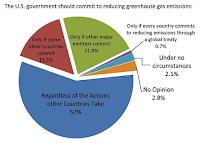One of the most interesting findings in the report is that the investment costs for the two scenarios are almost identical. In fact, because of savings due to reduced fuel costs and increased energy efficiency, the Action scenario is actually a bit cheaper than the Inaction scenario.
What is perhaps most surprising is that looking at the potential total spend on energy over the next quarter century, on an undiscounted basis the cost of following a low carbon route at $190.2 trillion is actually cheaper than our ‘Inaction’ scenario at $192 trillion. This, as we examine in this chapter, is due to the rapidly falling costs of renewables, which combined with lower fuel usage from energy efficiency investments actually result in significantly lower long term fuel bill. Yes, we have to invest more in the early years, but we potentially save later, not to mention the liabilities of climate change that we potentially avoid.... This conclusion soundly refutes the main argument against climate action – that it’s too expensive, with some contrarians even having gone so far as to claim that cutting carbon pollution will create an economic catastrophe. To the contrary, the Citi report finds that these investments will save money, before even accounting for the tremendous savings from avoiding climate damage costs.
...
The fossil fuel industry has extensive influence over many world governments. They hire Merchants of Doubt to spread disinformation and uncertainty about the science and economics of climate change, and spend billions of dollars in campaign contributions to American political candidates in order to delay the low-carbon transition that would benefit the global economy and most people.
They can’t, however, change the scientific and economic realities that clearly indicate we must take action to minimize the damages from human-caused global warming. As the Citi report concludes, the international climate conference in Paris at the end of this year will be a critical opportunity for world leaders to finally commit to curbing global warming for the benefit of the vast majority, at the expense of the few wealthy and powerful fossil fuel interests.
Read more at Citi Report: Slowing Global Warming Would Save Tens of Trillions of Dollars

No comments:
Post a Comment